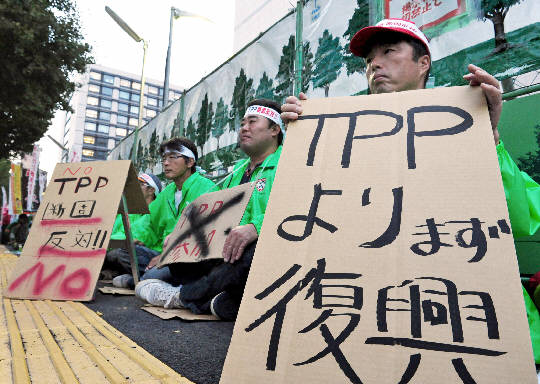Deep divide over Trans-Pacific Partnership

New Straits Times columnist | 09 January 2012
Deep divide over Trans-Pacific Partnership
By Mutsuko Murukami
EARLY in December, a good number of Japanese diplomats, agriculture policy makers and trade officials flew into Kuala Lumpur.
Trade experts of nine governments held an initial round of negotiations for building the Trans-Pacific Partnership (TPP), the regional free trade agreement now in focus.
The Japanese officials, however, remained outside the closed doors of the talks and ran around collecting information about the other countries’ discussion inside the rooms. The scene epitomises Japan’s lukewarm stance — and political pains — over the TPP.
The TPP aims to form an expansive free trade zone among partner countries in the Asia-Pacific region, based on the Apec framework. Nine countries — Australia, Brunei, Chile, Malaysia, New Zealand, Peru, Singapore, Vietnam and the United States — formally joined the negotiations.
They moved on to reach outlines of the agreement at the Apec summit held in Hawaii in mid-November. Japan’s Prime Minister Yoshihiko Noda said there that Japan would "start talks with other countries toward participating in TPP", indicating Japan’s interest but carefully avoiding a formal pledge of joining the partnership.
The world welcomed Noda’s comments in Hawaii as Japan’s "Go" sign: if Japan joins the group, the TPP represents the regional economy accounting for 35 per cent of the global gross domestic product (GDP). If Mexico and Canada, who both show interest, also join, it will be 40 per cent.
But Noda’s positive remark caused another round of furore back in Japan, where the TPP debates are causing a deep divide.
According to a recent poll of major daily newspaper Yomiuri Shimbun, 51 per cent support Noda’s decision of joining the TPP, while 35 per cent disapproved. (The rest were either undecided or gave no answer.)
Exporters of industrialised products — cars, electric appliances and high-tech machinery — are calling for the regional free trade agreement even louder than before. The sharp yen appreciation reduced the price competitiveness of their products dramatically last year in the global market.
The March quake and tsunami damaged the supply chain for their production, too, leading to Japan’s exports declining between April and September 2011. The current account surplus of Japan dropped 47 per cent during the period.
But many Japanese anticipate they will have more to lose than to gain by joining the free trade block, or foresee a devastating impact of opening the home market unconditionally to foreign products or services.
This time, it is not only a matter of cheaper imports hurting local businesses or increasing unemployment.
The fiercest opposition comes from traditional farmers, most of them with small patches of farms — protected for decades by government subsidies and high tariffs on imports, and lately by the income support policy.
Japanese farm products, therefore, have been made least price-competitive by global standards.
For example, Japanese rice is typically sold at 500 yen (RM20.42) per kg, while the same kind of short grain rice is available in the United States for 180 yen.
Japan imposes a tariff of 778 per cent on imported rice, 252 per cent on imported wheat and 325 per cent on imported sugar.
If cheaper farm products from TPP partner nations fill the Japanese market, "Japan’s agriculture will collapse", warns the Central Union of Agricultural Cooperatives, the national umbrella of Japanese farmers.
Thousands of farmers were visible out on Tokyo streets in November in protest, while pro-TPP commentators call for structural reforms of Japan’s uncompetitive farming.
Another controversial segment is medical service. In Japan, the government controls medicine prices within a relatively reasonable range.
People can access medical care covered by national health insurance.
The United States is reportedly interested in marketing American pricey drugs, providing non-insurance-covered expensive medical care and letting American businesses make inroads into the "market".
Japanese doctors warn that such deregulation would destroy Japan’s egalitarian public medical system and promote disparity in availability of top medical service between the rich and the poor.
It is important for Japan to appeal that it is open to trade partners and has no other choice but joining the regional free trade partnership.
But, one government official says, Japan and the US will after all account for more than 90 per cent of the total GDP of all the TPP partners.
For Japan, therefore, TPP will be almost a bilateral free trade agreement primarily with the US.
Japan has been vulnerable to diplomatic pressure of its major ally.
And that is the bottom line of the TPP controversies, he indicates.
It remains quite a challenge for the Noda administration to move ahead and join the partnership, while keeping everyone reasonably happy at home.





